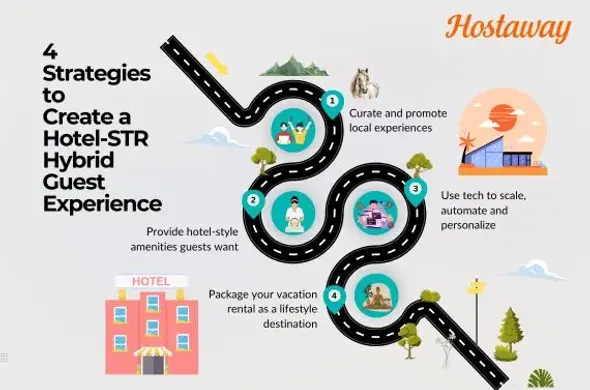The Hotel-STR Hybrid: How Short-Term Rentals Can Win Over Experience-Hungry Guests

Even as online booking platforms like Airbnb, Vrbo and Booking.com continue to fuel the growth of the global short-term rental industry, many travelers still associate hotels with convenience, service and activity-rich experiences — qualities that short-term rentals have struggled to match.
Now, a new report from travel market analyst Phocuswright proves that guests are wanting more. Nearly half (49%) of short-term rental (STR) guests — according to the study — find hotels to be a better option when it comes to planning trips around tours and activities. And over half (53%) believe hotels provide better support for non-lodging aspects of the trip.
This shift isn’t just theoretical. In May, Airbnb relaunched as an everything app, combining vacation rental accommodations with a suite of experiences and multiple concierge-like services in a single platform offering. It’s a clear sign that the vacation rental industry has entered a new era, where hosts must go beyond providing a place to sleep — they must deliver a holistic guest experience that rivals or exceeds that of hotels. And a wake-up call to short-term rental hosts everywhere.
In this article, we’ll explore what this trend means for property managers and short-term rental operators and provide practical strategies to stay ahead, satisfy guests and maximize revenue.
Why Guests Are Drawn to Hotels (Even When They Love Short-Term Rentals)
According to Phocuswright’s study:
49% of short-term rental guests said they trust hotels more to help them find tours and activities.
53% of respondents felt short-term rentals fell short in helping them plan full itineraries.
Why? Hotels have long understood that selling a stay means selling an experience. They upsell activities, local events, tours, spa services and dining — packaging experiences and services in a way that enhances the guest’s overall journey. By contrast, most short-term rentals still stop at “providing a place to stay.”
Hotels also hold the advantage in convenience. They simplify the travel experience by bundling services into one seamless stay. Now, vacation rentals are facing mounting pressure to provide the same — without the resources of a hotel chain.
But this challenge is also an opportunity for short-term rental operators to step up and offer the best of both worlds: The comfort and uniqueness of a home, with the immersive and curated perks that travelers crave.
Airbnb’s Relaunch: A Glimpse Into the Future
When Airbnb first launched its Experiences platform in 2016, it aimed to help guests immerse themselves in local culture. After being paused, Experiences are back — more curated and commercial than ever — along with Services, ranging from personal chefs and trainers to hairstylists and nail appointments.
By combining lodging with lifestyle, Airbnb is transforming into a comprehensive travel platform, not just a listing service. And whether you're listed on Airbnb or not, your guests are noticing.

The New Guest Profile: Experience-Hungry and Convenience-Obsessed
Today's travelers — especially Millennials and Gen Z, who account for 64% of vacation rental bookings — are driven by three core desires:
Authenticity: They want real, local experiences.
Convenience: They expect tech-enabled, frictionless services.
Personalization: They want hosts to anticipate and meet their needs.
This means your short-term rental must do more than provide a stylish and comfortable space. It must serve as a gateway to local discovery, while offering the comfort and reliability of a hotel.
And here’s the good news: Vacation rental property managers have a unique opportunity to blend both worlds.
4 Proven Strategies to Create a Hotel-STR Hybrid Guest Experience
1. Curate and promote local experiences
The number one takeaway from the Phocuswright data is this: Guests feel short-term rentals fall short in helping them discover what to do. Fix that, and you instantly gain an edge.
Partner with local providers (tours, yoga studios, wine tastings) and feature these in your website, emails and digital guidebooks.
Offer guests a “menu” of experiences before arrival — ideally with easy booking links.
Send pre-arrival emails recommending activities based on guest profiles (families, couples, business travelers, etc).
This turns your rental into a hub of local knowledge, adding value and creating new revenue-sharing opportunities.
2. Add hotel-style amenities that guests actually want
Hotel-like doesn’t mean corporate. It means thoughtful, reliable touches that make a stay more comfortable.
Here are a few features you can implement:
Mid-stay cleaning (optional or complimentary for longer bookings).
Stocked fridges or grocery delivery pre-check-in.
Local wellness services — mobile massages, yoga instructors or spa referrals.
Flexible check-in/check-out, especially for travelers arriving from different time zones.
Guests increasingly expect these options, so offering them, even as add-ons, boosts both satisfaction and spend.

3. Use tech to scale, automate and stay personal
Many hosts worry that adding services will increase complexity. That’s where the right property management software (PMS) comes in.
With Hostaway, for example, you can:
Automate guest messaging for experience recommendations or upsell offers.
Integrate third-party tools for check-in, cleaning, concierge and more.
Use centralized calendars and dashboards to track availability across channels, ensuring you can deliver these extras without added stress.
The key is to balance high-touch service with low-touch operations — a feat made possible by smart tech.
4. Package your property as a lifestyle destination
Don’t just rent a space — market a lifestyle.
Create themed packages: “Wine Lover’s Weekend,” “Wellness Escape,” “Family Adventure,” or “Remote Work Retreat.”
Use your listing titles and descriptions to highlight experiences: “Steps from the surf school” or “Chef’s kitchen with local food delivery.”
Include experiences in your photos and captions, showing guests what they can do, not just where they’ll sleep.
This is storytelling-driven marketing — and it's far more persuasive than generic listings.
The Short-Term Rental of the Future is a Hybrid
The hospitality landscape is evolving. The gap between “place to stay” and “experience to remember” is shrinking fast — and hosts who close that gap will win in 2025 and beyond.
By blending authenticity with convenience, and by leveraging an all-in-one vacation rental software platform like Hostaway to streamline, automate and personalize, you can create a high-value and memorable guest experience that competes head-to-head with hotels — without sacrificing what makes short-term rentals special.
Don’t wait for your competitors to catch up. The time to evolve is now.
Ready to find out how Hostaway can transform your business?
